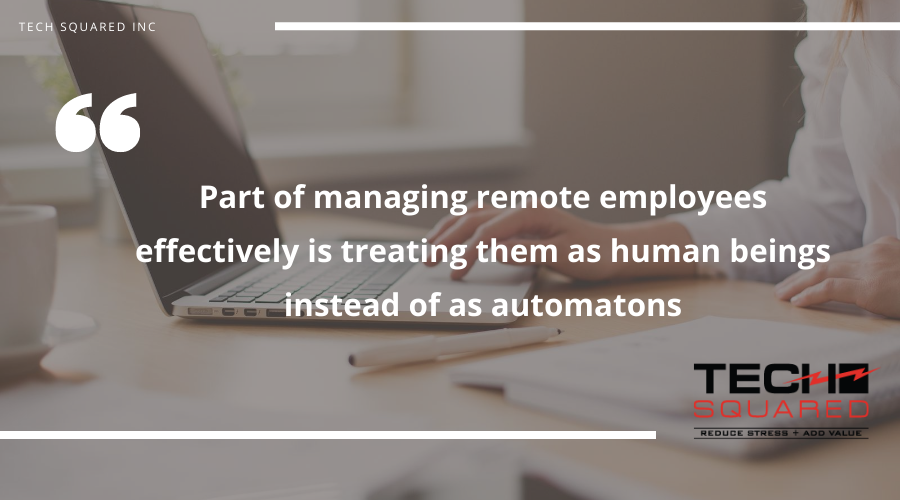As COVID-19 continues to take its toll on Virginia and the rest of the nation, business owners and managers increasingly recognize the importance of letting their staff work remotely. Not having to share rides during commutes to work and not having to congregate at the office help minimize your employees’ exposure to the novel coronavirus.
However, working from home can bring about feelings of social isolation. More than just being about getting work done, going to the office meant greeting colleagues as they walked by, sharing office gossip with the boss (or about the boss), and enjoying meals with teammates. All of these interactions are practically nonexistent in remote work arrangements. Day in and day out, clocking in feels like everything is just about work — and the monotony and isolation can drag morale down and eventually take productivity along with it.
To prevent this, you need to keep engaging remote employees. Here are three tips on how to do this.
-
-
Foster an active online community
While online exchanges don’t have the same impact as spontaneous face-to-face interactions, keeping in touch with one another is vital to counter feelings of loneliness and isolation that staff members may have. Therefore, online communication channels such as chat and web conferencing must also be used for other things besides discussing tasks and project updates.
Group shares
Part of managing remote employees effectively is treating them as human beings instead of as automatons. For example, during standups, ask people to share stories about how they’re entertaining themselves while social distancing. Have they taken up gardening or baking? Even if these casual conversations happen on a schedule, the banter, nevertheless, is a welcome reprieve from tasks and an opportunity to reconnect with friends.ERGs
Employees may also have concerns that affect their work, in which case employee resource groups (ERGs) can prove to be invaluable. For instance, today’s racially charged environment makes establishing anti-racism policies of utmost importance in organizations. Still, many Black, indigenous, and people of color (BIPOC) do not report instances of racial discrimination because of fear of retaliation. And more than allowing BIPOCs to air their grievances anonymously and report incidents on their behalf, ERGs can also inform staff and management alike on how to tackle issues such as microaggressions and racial justice.One-on-one sessions
Communion with people doesn’t necessarily have to occur in group settings all the time. You can create a virtual open door policy by letting staff approach you, and you can schedule one-on-ones where you just let people talk about whatever’s on their mind at the time. Conversations may feel forced at the start, but once you’ve shown genuine interest in your staff and gained their trust, you’d be surprised by how an hour could just fly by while shooting the breeze.This may seem counterproductive, but what you’re actually doing is allowing people to take their minds off work for a little while. Unbeknownst to them, such breaks may just be what they need to refresh their brains and do better at their tasks.
-
-
Hold quarterly virtual town hall meetings
From having established workplace policies to interiors reflecting corporate branding, a shared space helps conjure a corporate culture. However, being away from this space for extended periods of time can erode our sense of belonging in this culture. It’s like being abandoned on a desert island after having spent much time in a ship full of people all sailing in just one direction.
To address this, upper management must take the initiative by gathering everyone and reminding them of the company’s direction — as well as the shifts it must take to safely navigate the choppy waters of the current economy. Virtual town hall meetings are opportunities to be transparent about cost-cutting measures such as cancelled company outings, as well as share adjustments in corporate strategy as consumers change their spending.
After sharing your updates, grant your staff an open forum. Allow them to ask questions as well as raise their concerns, then answer these either then and there or at a later date. Doing all of these reaffirms in employees’ minds why they chose to work for your company and reinvigorates their commitment to it.
-
Provide online learning opportunities
In place of in-person mentorships and training seminars, have your staff enroll in online classes that update their current skills and/or add to their repertoire. This would give them access to skills and information beyond what they would learn on the job, allowing them to grow professionally. Moreover, online classes enable staff to proactively thwart the feelings of boredom and stagnation that make them go looking for better career opportunities. Last but not least, the company also benefits from having staff with enhanced capabilities, making online learning a win-win investment.
Tech Squared provides companies with IT solutions that support remote work arrangements. To learn how we can help you address the unique needs of your business, schedule a free consultation with us today.
More Than Just Tech Support


